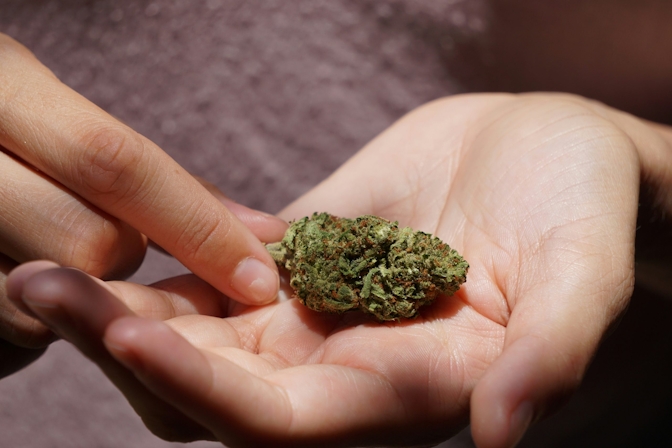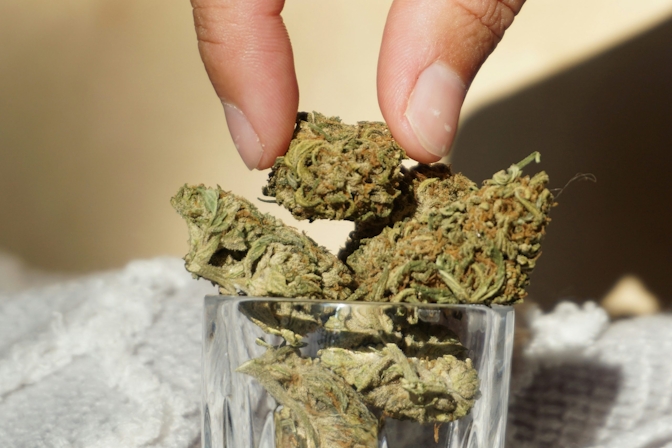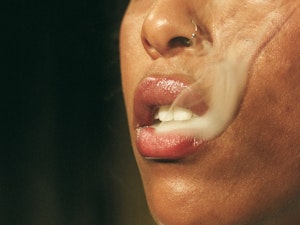
Herb
THCA vs. THCP: Why One Might Be Better for Daytime Use and the Other for Night
THCA vs. THCP: Two powerful cannabinoids with many differences.
What are THCA and THCP, and how do they actually compare? Both cannabinoids are gaining attention for their unique effects, but they exist at opposite ends of the potency spectrum and serve different purposes for different types of cannabis consumers. If you’re curious about how they stack up, which one is stronger, or whether THCA is safe to smoke at night, this guide breaks down everything you need to know.
Key Takeaways

Jackson Simmer / Unsplash
- THCA is the non-intoxicating precursor to THC and becomes psychoactive only after heat exposure (decarboxylation).
- THCP is a rare, highly potent cannabinoid that binds to CB1 receptors far more strongly than THC.
- THCA is widely available in flower, concentrates, and edibles; THCP is mainly found in infused vapes and dabs.
- THCP may produce a stronger high with small doses, while THCA may offer therapeutic benefits without intoxication.
- Neither cannabinoid has been studied extensively in humans, but early research suggests different safety considerations.
- New users should avoid THCP unless under expert guidance due to its intensity and limited research.
What Is THCA and THCP?

Elsa Olofsson / Unsplash
THCA (tetrahydrocannabinolic acid) is the precursor to THC, found in raw cannabis before it’s exposed to heat. It forms naturally in the plant as cannabinoids mature through a biosynthetic pathway involving CBGA (cannabigerolic acid). While THCA itself isn’t intoxicating, it has become popular among consumers who want the potential therapeutic benefits of cannabis without feeling high.
THCP (tetrahydrocannabiphorol), by contrast, isn’t abundant in raw cannabis. It exists in trace amounts, typically too small to isolate directly from the plant. Most THCP products on the market are made by converting CBD through a semi-synthetic process that alters the molecular structure. Its discovery in 2019 opened the door to more potent cannabinoids, but it also raised concerns about labeling, testing, and regulation.
In the broader cannabinoid family, THCA is part of the acidic cannabinoids (like CBDA and CBGA), while THCP is a homolog of THC with enhanced binding capacity. That fundamental difference shapes how they behave in the body and how they’re used in products.
The Most Important Difference Between THCA and THCP
The most important difference between THCA and THCP is psychoactive potency. THCA is non-intoxicating until heated, and even then, its effects are most comparable to standard THC. THCP, however, may be up to 33 times more active at CB1 receptors, meaning even small doses can feel stronger than high amounts of delta-9 THC. That makes THCP stronger than THCA in both lab results and real-world reports, though personal experience can vary.
THCA vs. THCP: Key Differences Explained

Mike Bowman / Unsplash
THCA and THCP may come from the same plant, but they show up in completely different ways, both in the cannabis plant itself and in how they’re used. To understand how they compare, it helps to look at where each one comes from, how they’re processed, and what kind of effects they deliver.
Natural Occurrence and Abundance
THCA is one of the most abundant cannabinoids in raw cannabis, found in high concentrations in most strains. It forms naturally in the plant as part of its growth cycle. THCP, by contrast, appears in extremely small amounts, too little to extract directly.
- THCA is produced naturally in most cannabis flower through the biosynthesis of CBGA.
- THCP occurs in trace quantities and is typically synthesized from hemp-derived CBD.
- THCA is common in legal dispensary products, while THCP is sold online, at gas stations, and smoke shops, where it remains legal.
Chemical Structure and Potency
The most important structural difference lies in THCP’s longer alkyl side chain, which allows it to bind more strongly to cannabinoid receptors, particularly CB1. This gives THCP significantly more pharmacological activity than both THC and THCA.
- THCA contains a carboxylic acid group, which must be removed (via heat) to become intoxicating.
- THCP shares a base structure with THC but has a longer side chain, increasing receptor binding.
- THCP binds up to 33x more strongly to CB1 receptors than THC, according to a 2019 study by Citti et al.
- Is THCP stronger than THCA? Yes, both in lab tests and based on consumer experiences.
Consumption Methods and Effects
These cannabinoids are consumed differently depending on form and intent. THCA can be consumed raw (non-intoxicating) or decarboxylated (intoxicating), while THCP is always used in its active form and typically appears in concentrated products.
- THCA is found in raw flower, pre-rolls, capsules, and tinctures; it only becomes psychoactive when heated.
- THCP is most often found in infused vape cartridges, dabs, and oil blends due to its synthetic nature.
- THCA effects (once activated) are similar to delta-9 THC; euphoric and manageable for most users.
- THCP effects are more intense: users often report a heavy body load, deep sedation, and altered perception.
- THCA is widely accessible in dispensaries and legal hemp shops. THCP is harder to find, often limited to online stores or specialized retailers.

Herb
Benefits
Both THCA and THCP may offer therapeutic value, but they do so in very different ways. THCA benefits have been studied more extensively for potential medical uses and are often preferred by consumers who want non-intoxicating symptom relief. THCP, on the other hand, is being explored primarily for its potency and possible benefits for high-tolerance users who need stronger effects than traditional THC can provide.
- THCA has shown potential for anti-inflammatory, neuroprotective, and anti-nausea effects.
- Some research also suggests THCA may have applications for autoimmune conditions or seizures when consumed in raw form.
- THCP may help with severe pain, insomnia, or appetite loss, especially in people who no longer respond well to THC.
- Animal studies suggest THCP produces stronger effects than THC, which may translate to stronger symptom relief, but more research is needed.
While THCA is already being integrated into medical cannabis products, THCP’s benefits remain largely anecdotal due to its novelty and lack of clinical research.
Safety
Is THCA safe? Most people tolerate it well, especially when it’s used in raw form or with minimal heat. It doesn’t produce a high unless decarboxylated, and side effects are rare when consumed that way. Some users find it helps with inflammation or nausea without the intensity that comes from THC.
Is THCP safe? That’s a bit more complicated. Because THCP binds so strongly to CB1 receptors, even small amounts can feel overwhelming. There’s also less research available, which makes it harder to predict how it affects different people. Until there’s more data and oversight, it’s best to treat THCP with caution and only buy from brands that provide full, trustworthy third-party lab testing results.
Legal Status
Is THCA legal? THCA legality exists in a gray area. In many U.S. states, it may be interpreted as being legal under hemp laws as long as the product remains below 0.3% delta-9 THC. However, because THCA converts to THC when heated, most jurisdictions where adult-use cannabis is illegal treat it as a controlled substance if you’re found with it in your possession.
Is THCP legal? THCP is technically legal if it’s hemp-derived and contains less than 0.3% delta-9 THC by dry weight. But like delta-8, it’s often flagged by regulators due to its potency and synthetic conversion process. Check your state laws before purchasing.
Daytime vs Nighttime Use: Which Cannabinoid Is Better?

If you’re looking for mild, clear-headed effects, THCA may be suitable for both day and night use, especially in raw or low-dose forms. For evening relaxation, THCA flower that’s been decarboxylated may help take the edge off without knocking you out.
THCP, on the other hand, is far more intense and often sedating. High-tolerance consumers may handle it during the day, but most will find it better suited for nighttime use, if at all. For new users, THCP is likely to be overwhelming regardless of timing.
Should New Users Ever Use THCP?
In general, no. THCP products are not designed for beginners. The dosing can be unpredictable, the effects are heavy, and the safety profile isn’t fully understood. If someone is new to cannabis and wants to experiment, low-THCA flower is a much safer place to start.
Are THCA and THCP Products Safe to Buy Online?

Christin Hume / Unsplash
Shopping online for cannabinoids isn’t automatically unsafe, but it does come with some real risks, especially when it comes to newer compounds. THCA products are usually easier to vet since they’re more common and often better regulated when sold within licensed cannabis markets. THCP products, on the other hand, deserve a closer look. Because there’s less oversight, mislabeling and inconsistent potency are frequent problems.
To lower your chances of ending up with something questionable:
- Look for a full Certificate of Analysis (COA) from a third-party lab.
- Check that the report includes both cannabinoid potency and contaminant testing.
- Avoid any product that doesn’t list a batch number or gives vague ingredient info.
- Stick with brands that show transparency about how the product was made.
If you’re unsure, take a look at Herb’s COA guide to learn how to read lab results and spot red flags before you buy.
Final Thoughts

Elsa Olofsson / Unsplash
So, which is better, THCA or THCP? It depends on what you’re looking for. If you want a milder, possibly therapeutic option without getting high, THCA may be the better fit. If you’re highly tolerant and looking for something heavier-hitting than THC, THCP could work, but only with careful dosing and verified products.
Before you decide, take the time to understand what each compound does, how it’s produced, and whether the product is safe and legal where you live.
For more in-depth answers, check out these FAQs:
Herb Recommended Products:
READ MORE










